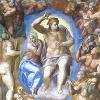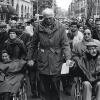
The Culture of Tolerance
The theme was prominent in the Document on Human Fraternity for World Peace and Life Together, signed in Abu Dhabi February 4, 2019, by Francis and the Grand Imam of al-Azhar, Ahmad al-Tayyeb. It states: “We, who believe in God, call upon the leaders of international politics and the world economy to work strenuously to spread the culture of tolerance and peaceful coexistence.”














.jpg)





